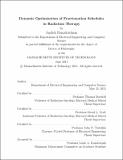Dynamic optimization of fractionation schedules in radiation therapy
Author(s)
Ramakrishnan, Jagdish
DownloadFull printable version (988.9Kb)
Other Contributors
Massachusetts Institute of Technology. Department of Electrical Engineering and Computer Science.
Advisor
Thomas Bortfeld, David L. Craft and John N. Tsitsiklis.
Terms of use
Metadata
Show full item recordAbstract
In this thesis, we investigate the improvement in treatment effectiveness when dynamically optimizing the fractionation scheme in radiation therapy. In the first part of the thesis, we consider delivering a different dose each day depending on the observed patient anatomy. Given that a fixed prescribed dose must be delivered to the tumor over the course of the treatment, such an approach results in a lower cumulative dose to a radio-sensitive organ-at-risk when compared to that resulting from standard fractionation. We use the dynamic programming algorithm to solve the problem exactly. Next, we suggest an approach which optimizes the fraction size and selects a treatment plan from a plan library. Computational results from patient datasets indicate this approach is beneficial. In the second part of the thesis, we analyze the effect of repopulation on the optimal fractionation scheme. A dynamic programming framework is developed to determine an optimal fractionation scheme based on a model of cell kill due to radiation and tumor growth in between treatment days. We prove that the optimal dose fractions are increasing over time. We find that the presence of accelerated tumor repopulation suggests larger dose fractions later in the treatment to compensate for the increased tumor proliferation.
Description
Thesis (Ph. D.)--Massachusetts Institute of Technology, Dept. of Electrical Engineering and Computer Science, 2013. This electronic version was submitted by the student author. The certified thesis is available in the Institute Archives and Special Collections. Cataloged from student-submitted PDF version of thesis. Includes bibliographical references (p. 145-156).
Date issued
2013Department
Massachusetts Institute of Technology. Department of Electrical Engineering and Computer SciencePublisher
Massachusetts Institute of Technology
Keywords
Electrical Engineering and Computer Science.